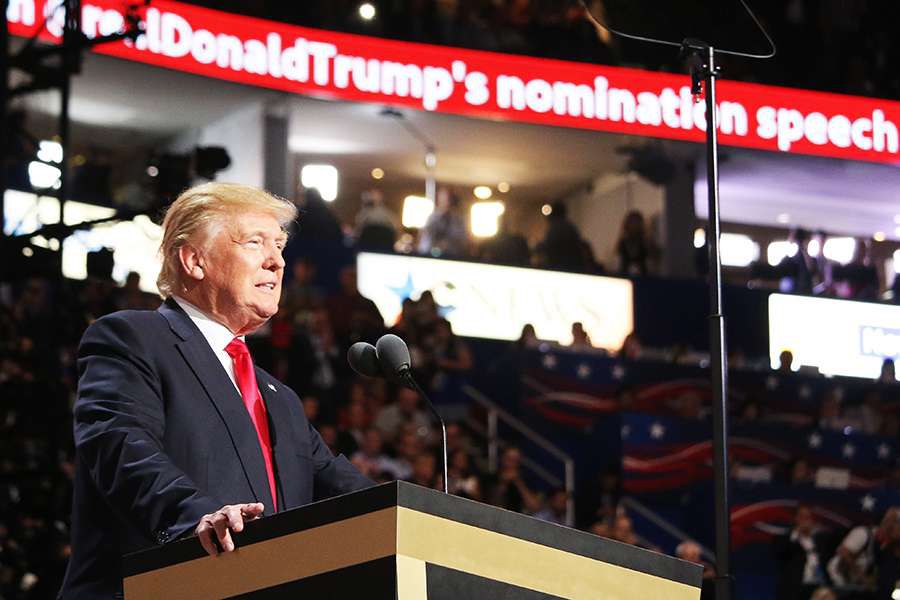Washington D.C., May 1, 2017 / 04:30 pm (CNA/EWTN News).- More than 50 members of Congress have written President Donald Trump asking for a broad executive order that protects religious freedom. “Freedom to follow one’s conscience, faith and deeply held moral convictions is at the heart of our country’s identity,” said Rep. Randy Hultgren (R-Ill.), one of the letter’s signatories.
House Republicans recently sent a letter to President Trump asking for an executive order that could protect the religious freedom of various entities, USA Today reported. “We write to express our encouragement and support for prompt executive action ensuring religious liberty protections for all Americans and look forward to working with you on complementary legislation,” the letter stated.
Religious freedom advocates have warned that, due to various mandates and rules issued during the Obama administration, religious institutions that uphold traditional marriage or do not cooperate with abortions and contraceptive use could soon face federal action if no executive order is issued to protect them.
A draft of such an executive order was leaked earlier this year, but was reportedly scuttled due to the efforts of Trump’s daughter Ivanka and her husband Jared Kushner. “Americans don’t give up those freedoms when they open a family business or enter the workplace or provide health coverage for their employees,” Hultgren stated. “The federal government has recently handed down more and more mandates on Americans — it’s time to reverse this trend. Protecting individual liberty is crucial to ensuring a free society.”
One example the lawmakers cited for where such an order could be effective was a repeal of the HHS birth control mandate, which caused hundreds of religious non-profits and other employers to sue the federal government claiming the mandate forced them to violate their consciences. The Trump administration has not yet stopped defending the mandate in court, although White House advisor Leonard Leo told Axios recently that the administration was not planning to defend the mandate indefinitely, but was rather still considering the best “litigation proof” route for lifting the mandate’s burden on religious employers.
Another reason for an executive order would be the protection of health care providers and crisis pregnancy centers from mandates that they perform abortions or cover them in employee health plans, the letter claimed. “Despite clear federal statutes to the contrary, medical professionals have been forced by their employing hospitals to assist in abortions and state governments such as California have required religious organizations to cover abortion in their health plans,” the members of Congress stated.
Currently, the Weldon Amendments bars federal funding of states that force employers to provide abortion coverage for employees. But after California ruled that health care plans — including those of churches and religious organizations — had to include coverage for elective abortions, the head of the Office of Civil Rights at the federal Department of Health and Human Services decided last summer that the state had not violated the Weldon Amendment. An executive order, the Congressmen claim, could fix this violation of the freedoms of churches and religious employers.
Also at stake is the tax-exempt status of schools and other religious institutions which teach that marriage is one man and one woman, the letter claimed. For this, the signatories cited President Obama’s solicitor general Donald Verrilli, who said in 2015 oral arguments in the same-sex marriage case Obergefell v. Hodges, that the ability of these colleges to retain their tax-exempt status if same-sex marriage is the law of the land is “certainly going to be an issue.”
The Trump administration, the members of Congress said, “need not and should not wait for Congress to act before ordering the federal government to stop discriminating against individuals and institutions because of their reasonable beliefs on issues of deep concern to people of faith and good will.”
Another way an executive order could protect religious freedom would be to protect federal contractors, and dioceses and churches that provide military chaplains, from having to comply with mandates that they support same-sex marriage. The Russell Amendment had upheld this freedom and was included in the 2017 National Defense Authorization Act that passed the House, but was removed by Senate Republicans so the bill could pass the Senate.
“Any Executive Order should make it clear that religious freedom entails more than the freedom to worship but also includes the ability to act on one's beliefs,” the U.S. Bishops’ Conference stated earlier this year on the need for an executive order. “It should also protect individuals and families who run closely-held businesses in accordance with their faith to the greatest extent possible.”

